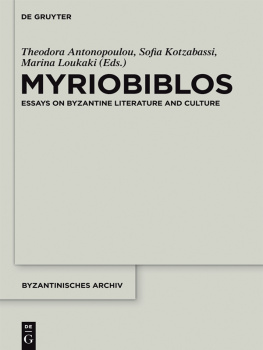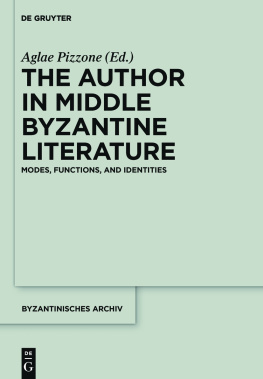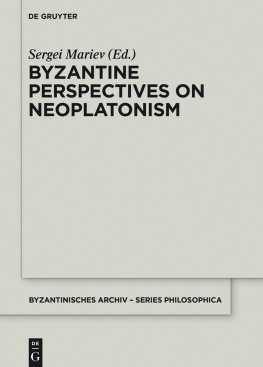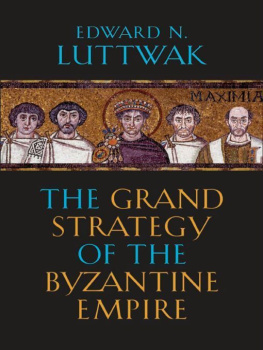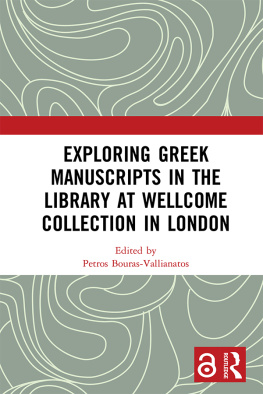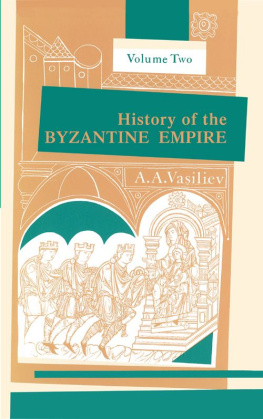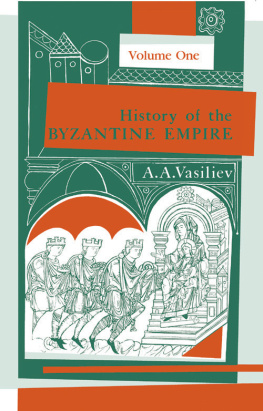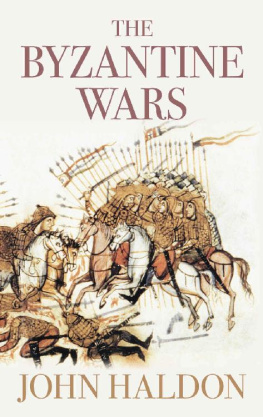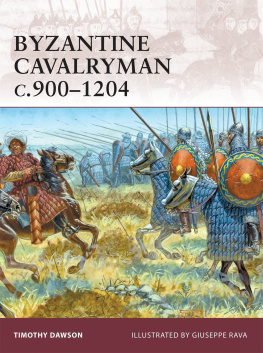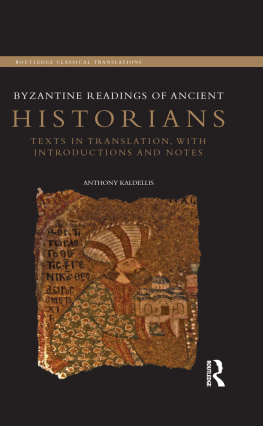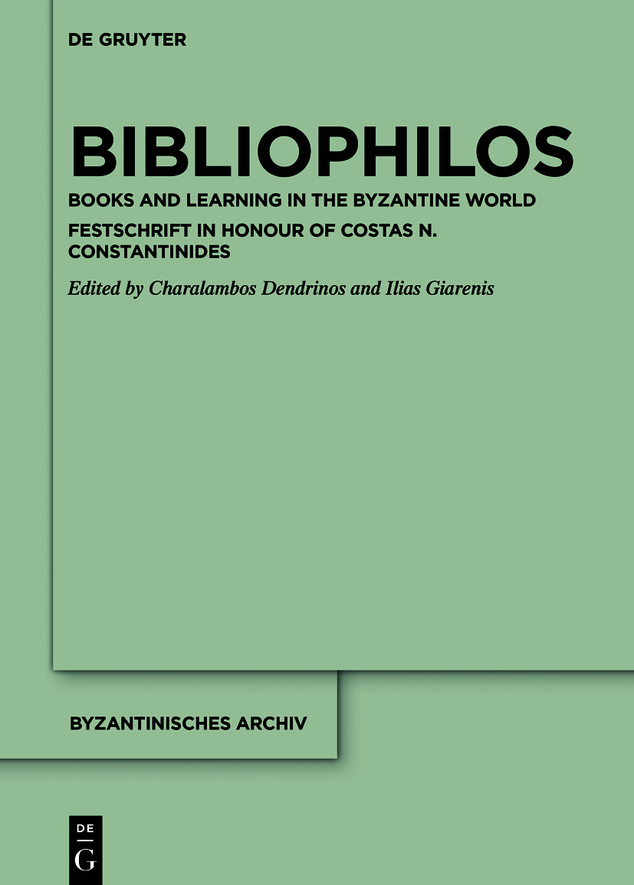Byzantinisches Archiv
Als Ergnzung zur Byzantinischen Zeitschrift
Edited by
Karl Krumbacher
August Heisenberg
Volume
ISBN 9783110717099
e-ISBN (PDF) 9783110718492
e-ISBN (EPUB) 9783110718546
Bibliographic information published by the Deutsche Nationalbibliothek
The Deutsche Nationalbibliothek lists this publication in the Deutsche Nationalbibliografie; detailed bibliographic data are available on the Internet at http://dnb.dnb.de.
2021 Walter de Gruyter GmbH, Berlin/Boston
Abbreviations
AnBoll
Analecta Bollandiana
BF
Byzantinische Forschungen
BMGS
Byzantine and Modern Greek Studies
BNJ
Byzantinisch- und Neugriechische Jahrbcher
BollGrott
Bolletino della Badia Greca di Grottaferrata
Byz.
Byzantion
Byzsl
Byzantinoslavica
yzantinische Zeitschrift
CCSG
Corpus Christianorum, Series Graeca
CFHB
Corpus Fontium Historiae Byzantinae
CPG
Clavis Patrum Graecorum
CSHB
Corpus Scriptorum Historiae Byzantinae
DOP
Dumbarton Oaks Papers
DOS
Dumbarton Oaks Studies
DOT
Dumbarton Oaks Texts
GRBS
Greek, Roman and Byzantine Studies
JHA
Journal for the History of Astronomy
JB
Jahrbuch der sterreichischen Byzantinistik
LChI
Lexikon der christlichen Ikonographie
OCP
Orientalia Christiana Periodica
ODB
Oxford Dictionary of Byzantium
PG
Patrologia Graeca
PLP
Prosopographisches Lexikon der Palaiologenzeit
Rbk
Reallexikon zur byzantinischen Kunst
REB
Revue des tudes Byzantines
RGK
Repertorium der griechischen Kopisten
RSBN
Rivista di studi bizantini e neoellenici
SC
Sources Chrtiennes
SETE
Segno e Testo
StT
Studi e Testi
Travaux et mmoires
VV
Vizantijskij Vremmenik
WBS
Wiener byzantinistische Studien
A poem by Manuel, a baptised Jew: was he a student of Nikephoros Blemmydes?
Dr Demetrios C. Agoritsas
, Ptolemaida, Greece
Over a century ago, the distinguished scholar Nikos A. Bees conducted systematic in situ research in the monastic libraries of Meteora (Thessaly). In his published Report () he recorded most of his significant findings, including manuscripts and noteworthy texts as well as imperial, patriarchal and other documents. Among other texts, Bees also copied another metrical text, in iambic verses, attributed to a certain kyr Manuel, a baptised Jew and student of the great philosopher and scholar kyr Blemmydes.
These verses were included in Meteora, Varlaamensis 167, ff.221v222r (Pls 12), Folios2r, 17r, 247r are blank.
The codex consists of a good quality thick whitish western paper with watermarks. A deep black ink was used for the text and red for the initial letters and the headings, both well preserved. The scribes employ the conventional abbreviations and write their text in a small, clear script slightly inclined to the right. The only watermark identified in the manuscript is an Ancre in a circle and letters, which is similar to Harlfinger Ancre 53 dated in 1563.
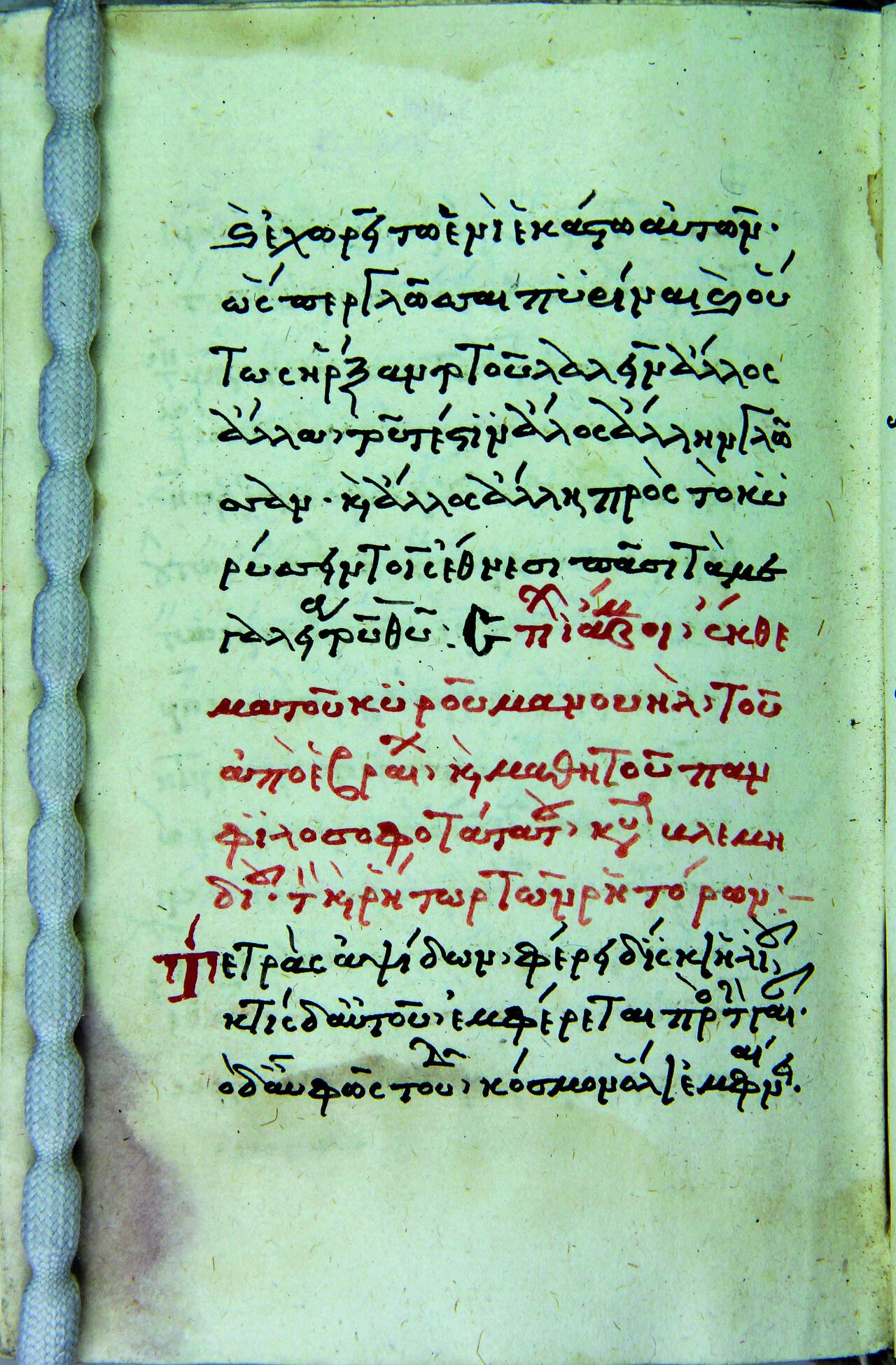
Plate 1 Cod. Meteora, Varlaamensis 167, f.221v. Holy Monastery of Varlaam, Meteora.
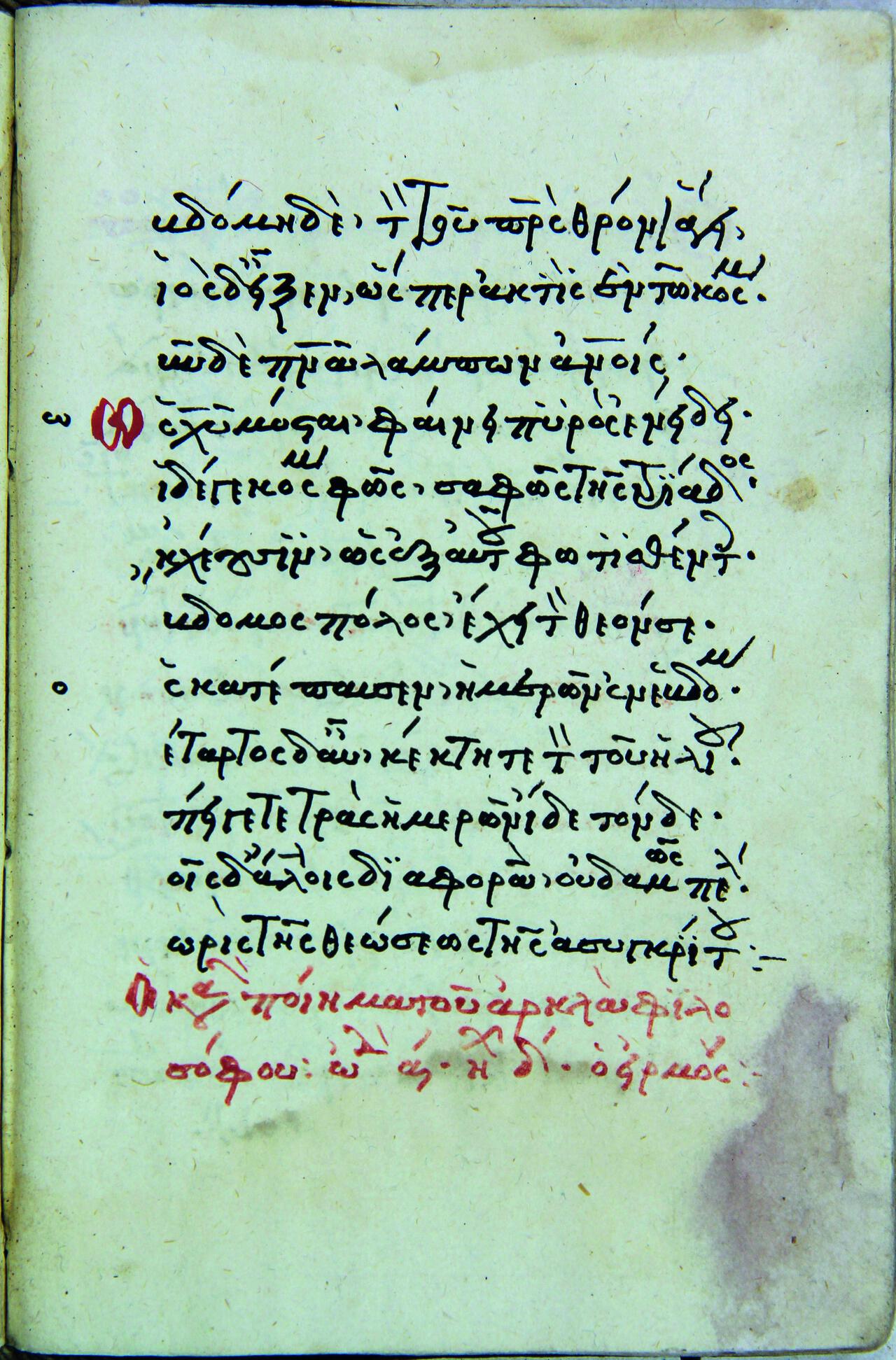
Plate 2 Cod. Meteora, Varlaamensis 167, f.222r. Holy Monastery of Varlaam, Meteora.
The manuscript contains mostly canons and a number of troparia with theological and literary scholia. Besides Manuels poem, the only worthwhile text of the volume appears to be a canon by Arklas the philosopher: (f. 222r). On ff.1rv, 2v3v, 247v appear probationes pennae. On the interior of the back cover (= 248r), the following note was copied twice: | | | () () () | | [or ] | .
The codex preserves its original binding, in a black stamped leather on wooden boards, 8mm thick. The front cover is badly damaged. The decorative pattern consists of a rectangle enclosed by double imprinted lines crossed by two diagonal and one horizontal line as well as by a large rhombus. Within the above-mentioned pattern there are two rhombi and twelve triangles decorated by small stamps consisting of two concentric circles. This decorative type is common in Byzantine bindings and was still in use during the 16th century. Its fastenings are also of Byzantine type, consisting of a triple four-thong braid strap with a metal ring.
Manuels poem is composed in 15 iambic dodecasyllabic verses, with the exception of verses 6, 10 and 14. Apart from the first verse, the rest have the first word incomplete as their first letter was never executed by the rubricator. So far, this poem is known only from codex Varlaamensis. It is not included in the catalogues of Vassiss Initia Carminum Byzantinorum,
Manuels poem is edited below with tacit corrections in orthography and omissions of mute iota; additions appear in pointing brackets <>; abbreviations and contracted nomina sacra are expanded; all other corrections and amendments appear in the apparatus criticus. A short apparatus fontium and an English translation of the text poem are also provided.
Cod. Meteora, Varlaamensis 167, ff.221v222r
f. 221v
, , ,
<> ,
:-
, ,
<> , <>
f. 222r
<> ,
<> , ,
<> , <>.
<>
,
<> , T
<>,
<> ,
<> ,
<> ,
<>
<> , <>
<> .
Tit.scripsi: {} cod. scripsi: cod. scripsi: cod. scripsi: cod. scripsi: cod. cod. cod. cod. cod. scripsi: cod. scripsi: cod. scripsi: cod.
Cf. Gen. 2:3 Cf. Gen. 1:19
Iambic verses, composed by lord Manuel, a baptised Jew and student of the great philosopher and rhtr tn rhtorn, lord Blemmydes
Four arches support the solar disk / while its ray is directed to the earth. / Its light illuminates again the whole world, / while a seventh ray leads to the Fathers throne. / The Son reached the world just like a beam / and now as a shining Spirit mankind, / to the initiated of Christ [it appears] in the form of fire. / And they pour forth the adornment light of the Trinity / as they were enlightened by it. / The seventh vault carries you, God, / Who concluded on the seventh day, / while the fourth depicts again the sun, / because the creation saw him on the fourth day . / As for the rest I am carried away, I do not exist at all / without the incomparable theosis.
The composer of the poem, Manuel, a baptised Jew, is not known from other sources. He claims to be a student of Nikephoros Blemmydes (PLP 2897) whom he calls great philosopher () and rhtr tn rhtorn. We know that Blemmydes was appointed by the Patriarch GermanosII (12231240) as reader in the Patriarchate in Nicaea (ca.1223/24), deacon and later logothets. He refused any secular or ecclesiastical office, including the patriarchal throne, and remained a monk throughout his life (ca.1272).
The above arrangement was halted when Blemmydes was accused by two of his students, Krateros and Romanos, of mismanaging money that belonged to Constantine Manasses, the former Metropolitan of Ephesos. Furthermore, Blemmydes was accused of issues relating to Orthodox dogma and, although he was cleared of these charges, he refused to accept any other pupils from then onwards. A few years later (ca.1245/46) he was asked to become the head of a secular higher education institution in Nicaea, but he refused again. Instead, he had chosen isolation by founding a monastic school in Emathia, near Ephesos (ca.1248) where he continued to teach, primarily monks, until his death (ca.1272).


